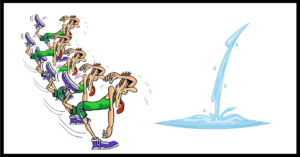The hidden dangers caused by sleep deprivation can be lethal. Chronic sleep deprivation is associated with diseases such as diabetes, heart attack, obesity and depression. It is estimated that about a third of the population is in sleep debt, and on average we sleep for ninety minutes less now than we did ten years ago.
Sleep deprivation has an adverse effect on our cognitive function. We experience attention difficulties, and beyond sixteen hours of wakefulness we experience impairments to our driving ability similar to that of someone with a .08 alcohol reading. Tests have shown people to make ten times as many mistakes when tired, and tiredness accounts for one third of all work place accidents.
One quarter of all motor vehicle accidents in Australia are attributed at least in part to drowsiness; it is estimated that eighty thousand drivers fall asleep at the wheel every day in the US, and in the UK a drowsy driver was convicted of causing ten deaths. An experiment on a subject who had had nine hours sleep in three days showed he had eighteen micro sleeps during a driving test. They were of 3-13 seconds duration, with an average of 7.8 seconds. In a two hour driving test, the subject was actually asleep for a total of twenty five minutes. The subject was fully asleep whilst driving, not just when the vehicle was stopped at traffic lights etc. During tiredness, parts of the brain go to sleep, even though the body is still awake. This is a frightening thought for those of us who are driving children around after many many nights of sleep deprivation due to those same beautiful beings!
Tiredness reduces the body’s resistance to disease. The body behaves as if it is under contstant stress and the immune system is then required to respond constantly. Eventually it fatigues and your body becomes less able to fight bugs.
Do you get more then seven hours of sleep each night? If you don’t, you need to reassess your sleep habits. You are at an increased risk of weight gain, heart attack. and stroke. Men tend to gain weight around the belly and the neck. This extra fat in the neck impinges on the throat and can result in sleep apnoea. When sleep apnoea is eliminated, large increases in the output of the heart can be measured. and the heart does not have to work so hard. Research has also shown you are at greater risk of stroke if you suffer from sleep apnoea. With just under 15% of Australian adults suffering from the condition, it is worthwhile getting yourself checked out if you never seem to wake up feeling rested.
Chronic sleep deprivation increases your risk of developing Type II diabetes by 50%. With sleep deprivation, insulin sensitivity decreases, and production of insulin decreases as the stress response reduces pancreatic production of insulin. Too little sleep can have an adverse effect on the way the body processes glucose.
Sleep and Weight Loss. I often hear from clients that they have tried everything, but just don’t seem to be able to limit their food intake. The first question I ask is how much sleep are you getting? Tiredness upsets the balance of hormones which perceive hunger and control appetite. There is an over supply of the hormone which tells you you are hungry, and an under supply of the hormone which tells you you are full. So, even though you may eat a lot and actually be “full” your body still feels hungry, your body does not turn off the sensation of wanting to eat. One subject in a sleep deprivation study measured a 50% decrease in insulin production and a 50% decrease in the production of leptin the hormone which switches off hunger. With these types of hormonal imbalances happening, is it any wonder you find it difficult to lose weight, let alone function efficiently.
Ask yourself this question. Do you remember what it feels like to be really wide awake?
If the answer is no, then take some action to get yourself back into peak physical shape, and change your sleep habits.
- Aim to be in bed for at least eight and a half hours every night. This will allow you plenty of time to get to sleep.
- Plan to be awake at the same time every morning, regardless of what you have on that day.
- Don’t turn the TV on and start watching a programme that finishes past your bedtime, kidding yourself that you will turn it off half way through and go to bed. You’ll be amazed at all the things you can get done if you don’t turn the TV on at all.
- Do enough exercise to tire you out, but do not over train, as this will lead to difficulties in sleeping
- If you cannot sleep, don’t just lie there squeezing your eyes shut and yelling at yourself to go to sleep. If you are awake for more then fifteen minutes in the middle of the night, get up and do something boring, and try again in 25 minutes or so.
- If you really think you are getting enough sleep but you still feel tired every morning, see your doctor and ask to have the situation looked into further. You could have a simple vitamin or mineral deficiency, or you could be suffering from sleep apnoea.
It is not normal to feel tired all the time, so take the time to find out what’s going on. It may just save your life, or the life of somebody else.
Source: SBS documentary Dead Tired. Screened 27/05/09



